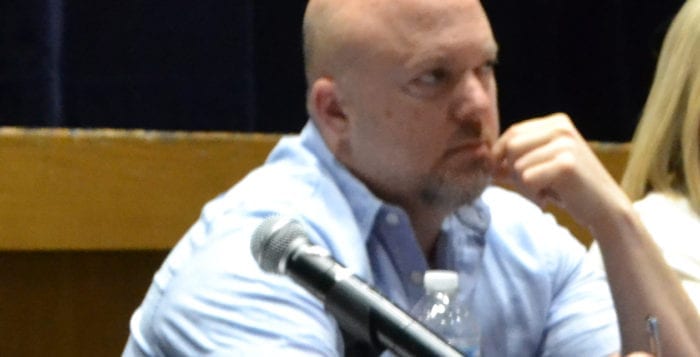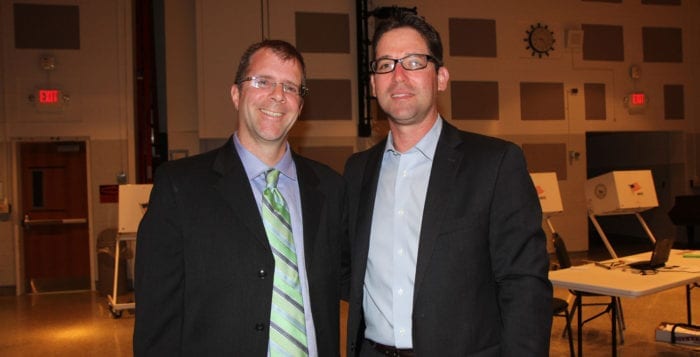A Port Jefferson School District board of education candidate has agreed to pay a settlement to resolve a legal issue pertaining to his day job.
A pediatrics practice with several Long Island locations, including one in Port Jefferson, and its current and former partner physicians agreed to pay $750,000 to settle claims of improper Medicaid billing practices, according to an April 25 announcement by the United States Attorney’s Office for the Eastern District of New York. One of the partners of Pediatrics and Adolescent Medicine, the practice named in the press release, is Dr. Jason Kronberg, a Port Jefferson resident running for one of the school district’s three board of education seats up for election May 15. The practice operates as a limited liability partnership under the name Freed, Kleinberg, Nussbaum, Festa & Kronberg M.D. The legal action was brought about by a whistleblower, and the case was pursued under the federal False Claims Act and the New York State False Claims Act jointly by federal and state investigators.
“The practice corrected the problem on our own in 2011, and we have had no issues since that point.”
— Jason Kronberg
According to the release, the practice billed the Medicaid program, which provides health coverage to millions of Americans including eligible low-income adults, children, people with disabilities and others and is jointly funded by state and federal governments, for services provided by physicians who were not enrolled in the program. Between July 2004 and December 2010, the practice and its partners employed a number of physicians who were not enrolled in the Medicaid program yet still provided care to Medicaid patients, the government’s investigation revealed. The defendants sought reimbursement from Medicaid for services provided by non-Medicaid enrolled physicians and did so by misrepresenting the identities of the individuals actually providing the treatment, the release said.
“The settlement related to billing practices from over eight years ago, a period when, for the most part, I was just an employee of the practice,” Kronberg said in an email, adding that the settlement shouldn’t interfere with his school board candidacy. “The practice corrected the problem on our own in 2011, and we have had no issues since that point. Given the extraordinarily complex nature of Medicaid billing rules, settlements like this are quite common – the government enters into thousands of them every year. We cooperated fully with the government investigation of this matter and we resolved the case with the government amicably.”
According to the complaint by the whistleblower’s attorneys accessed after Kronberg’s initial statement, he was a partner “at all relevant times herein.”
“I was a partner starting July 2009,” Kronberg said. “The complaint was 2005 to 2010. The statement said ‘for the most part’ — which is accurate.”
A request for comment sent to Kronberg’s defense attorney Christopher Fenlon was not returned, nor was a request sent to district Superintendent Paul Casciano.
“Today’s settlement reflects this office’s commitment to safeguarding taxpayer programs like Medicaid by vigorously investigating allegations of fraud in False Claims Act cases.”
— Richard Donoghue
According to Jay Worona, deputy executive director and general counsel of the New York State School Board’s Association, an organization that provides support for school boards in the state, the settlement will have no impact on Kronberg’s bid for Port Jeff’s board. Worona said anyone qualified to vote is eligible to run for a board of education position in New York, with a felony conviction being the only disqualifier, adding that it will be up to the voters to decide.
“Providers serving Medicaid beneficiaries must be properly credentialed and thoroughly vetted to ensure that proper care is provided and to preserve the integrity of the Medicaid Program, which serves our neediest citizens,” U.S. Attorney Richard Donoghue said in a statement. “Today’s settlement reflects this office’s commitment to safeguarding taxpayer programs like Medicaid by vigorously investigating allegations of fraud in False Claims Act cases.”
As part of the settlement, New York’s Medicaid program will receive $450,000 of the $750,000 payment, according to New York Attorney General Eric Schneiderman’s office’s press release on the matter.
Kronberg said during a meet the candidates event at the high school April 24 he was seeking a seat on the board to lend his willingness to listen to all sides of a debate and weigh in impartially. He is one of six candidates running to fill three seats.
“I was asked to become a member of the school board to serve as a rational and non-biased voice in what has become a contentious environment,” he said in a personal statement. “I believe I will bring to the board a fiscally conservative yet socially liberal viewpoint.”
This post was updated May 1 with information from the complaint filed by the whistleblower and a second comment from Jason Kronberg.







 “I did nine years, the community doesn’t want me, that’s it — I’m done,” Costas said. “I get the message. I’m glad the budget passed and I give the best of luck to the new board.”
“I did nine years, the community doesn’t want me, that’s it — I’m done,” Costas said. “I get the message. I’m glad the budget passed and I give the best of luck to the new board.”

 “It feels great,” Bianco said after the results were announced. “It feels very nice to know that you’ve done this for three years and people trust you to look after their kids for another three years. I’m [also] very happy that the budget passed by such a wide margin.”
“It feels great,” Bianco said after the results were announced. “It feels very nice to know that you’ve done this for three years and people trust you to look after their kids for another three years. I’m [also] very happy that the budget passed by such a wide margin.” Leader of the pack Waldron said she was happy to be able to continue to serve.
Leader of the pack Waldron said she was happy to be able to continue to serve. Plourde declined to comment, and Gribbin was not at the district Tuesday night. In a Facebook post he thanked supporters.
Plourde declined to comment, and Gribbin was not at the district Tuesday night. In a Facebook post he thanked supporters.












